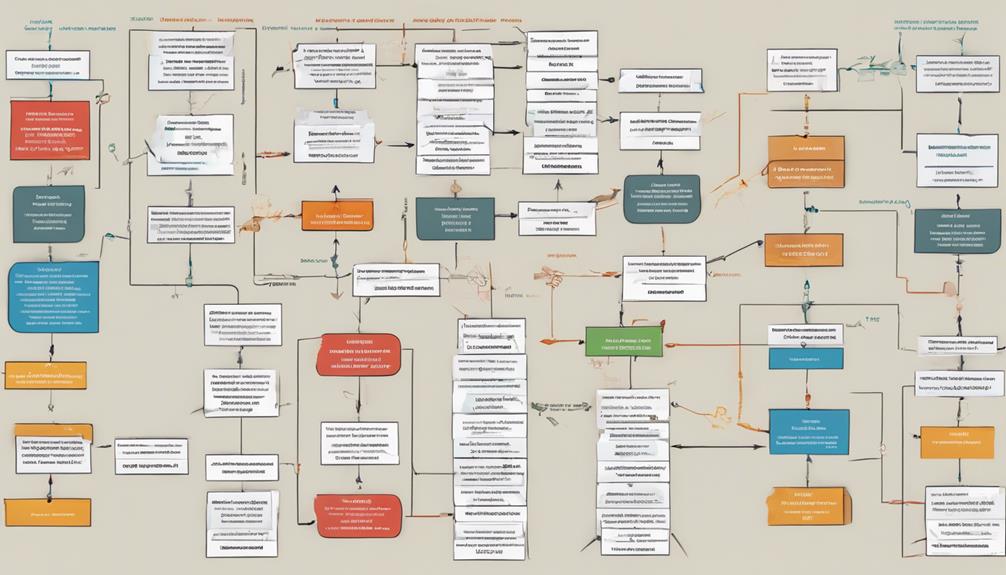Understanding DuPage's restricted cases is essential for legal navigation. Inactive, impounded, sealed, or expunged cases limit access. Juvenile cases have added privacy safeguards. Legal factors and nature of information determine restrictions. Breaching can lead to legal repercussions due to confidentiality concerns. Modifications require court approval under specific conditions. Seeking legal help is critical for proper authorization. Encore their knowledge with further insights into DuPage's complex legal landscape.
Key Takeaways
- DuPage's restricted cases include sealed, expunged, and impounded cases.
- Unauthorized access can have legal repercussions due to confidentiality concerns.
- Modifications in restricted cases require court approval and valid justifications.
- Access to restricted cases requires authorization from the court.
- Seeking legal help from experienced attorneys is crucial for handling restricted cases properly.
Legal Definition of Restricted Cases
Defining restricted cases in the DuPage County Circuit Court involves categorizing cases as inactive, impounded, sealed, or expunged to safeguard sensitive information and maintain confidentiality. Inactive cases are those on hold or without recent activity.
Impounded cases are sealed by court order, often involving sensitive details. Sealed cases are inaccessible to the public, preserving privacy. Expunged cases are those erased from records, typically after meeting certain criteria. These measures guarantee that confidential information remains protected and out of public view.
Cases involving juvenile defendants receive additional privacy safeguards to shield their identities and proceedings from the public eye. Access to restricted cases is strictly controlled, limited to authorized personnel to prevent unauthorized dissemination of information.
The Clerk's office meticulously reviews requests for access to these cases to uphold privacy laws and maintain the integrity of the restricted case system in DuPage County Circuit Court.
Factors Determining Restricted Cases

Factors determining restricted cases in the DuPage County Circuit Court include the nature of the information involved and the legal requirements for safeguarding confidentiality. Certain types of cases, such as sealed, expunged, or impounded cases, are automatically considered restricted. Cases involving juvenile defendants as the first named party are also commonly restricted from public access. Additionally, inactive cases and those restricted for legal reasons fall under this category. Unauthorized attempts to access such cases can result in legal consequences and potential prosecution. Access to restricted cases is strictly limited to authorized personnel, including attorneys, law enforcement officials, and other approved individuals.
| Factors | Examples |
|---|---|
| Nature of Information | Sealed, expunged, impounded cases |
| Legal Requirements | Cases involving juvenile defendants, inactive cases |
Consequences of Restricted Cases

Restricted cases in the DuPage County Circuit Court can lead to severe consequences for those who attempt unauthorized access. These cases often involve sensitive information or ongoing investigations, warranting restricted access to authorized personnel only.
Individuals trying to breach this restriction may face legal repercussions due to the confidentiality and privacy concerns surrounding these cases. The restricted cases may encompass high-profile or confidential matters that necessitate special handling to safeguard the integrity of the legal process and the individuals involved.
Modifications in Restricted Cases

Modifications in restricted cases can be authorized under specific conditions, subject to court approval and supported by valid justifications and legal arguments. These modifications may be considered when there are changing circumstances or new evidence that warrant a review of the restrictions imposed. Court approval is typically necessary for any modifications in restricted cases to guarantee that the process follows the appropriate legal procedures.
When seeking a modification, it's important to provide valid reasons and legal arguments to support the request. This often involves filing a motion with the court outlining the proposed changes and the rationale behind them. It's advisable to seek legal representation when pursuing modifications in restricted cases to navigate the legal complexities effectively and make certain that all necessary steps are taken in accordance with the law. Having knowledgeable legal support can increase the chances of a successful modification outcome.
Seeking Legal Help for Restricted Cases

Legal support is essential for individuals managing cases with limited information in DuPage County. Access to restricted cases requires authorization from the 18th Judicial Circuit Clerks office, usually granted within two business days. Attorneys, law enforcement, and self-represented litigants must request access, with reactivated accounts needing new user IDs for entry. Experienced family law attorneys can offer valuable assistance in guiding and litigating cases with restricted details.
Unauthorized attempts to view restricted cases may result in prosecution, emphasizing the importance of obtaining proper authorization. Seeking legal help is vital for understanding the complexities of restricted cases and ensuring compliance with DuPage County's regulations. By enlisting the expertise of knowledgeable legal professionals, individuals can effectively manage their cases and pursue favorable outcomes within the bounds of the law.
Frequently Asked Questions
Are Cell Phones Allowed in Dupage County Courthouse?
Cell phones are allowed in the DuPage County Courthouse, but they must be turned off in courtrooms. Photography and recording are not permitted without prior authorization. It is advised to check the specific rules before visiting.
How Much Does It Cost to File in Small Claims Court in Dupage County?
Filing a small claims case in DuPage County costs $182 for claims up to $10,000 and $282 for claims between $10,001 and $25,000. Additional fees for service of process may apply. Fees are non-refundable.
What Is the Dupage County Pro Se?
The DuPage County Pro Se program empowers individuals to represent themselves in court. It offers resources, assistance, and workshops to navigate the legal system. One interesting statistic reveals a 20% increase in self-represented litigants utilizing the program last year.
How to File for a Divorce in Dupage County?
To file for a divorce in DuPage County, one must meet residency requirements, fill out a Petition for Dissolution of Marriage, serve their spouse, and attend court hearings. Consulting with a divorce attorney can help navigate the process.
Conclusion
To sum up, maneuvering through Dupage's limited cases can be a challenging ordeal.
Keep in mind, restricted cases are like a puzzle book with all the twists and turns, but regrettably, you can't skip to the final chapter.
Seek legal guidance to unravel the complexities and avoid getting lost in the legal maze.
Stay informed, stay cautious, and remember, the law waits for no one.
Good luck, detective!










